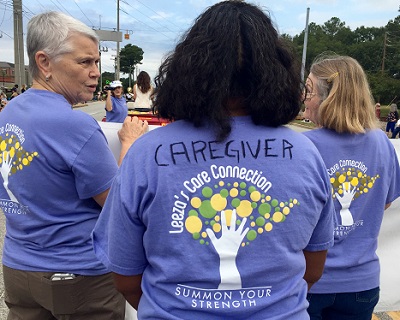What it Means to be a Caregiver
Who Are Caregivers?
C
-
arrange, pay for and manage their care
-
provide emotional support
-
coordinate with family members
-
provide safety, nutrition and medication
-
and so much more!
As a caregiver, you may feel guilty or misunderstood by others who aren't on the front lines. Managing family dynamics, coping with criticism and juggling expectations can all lead to high stress and even burnout without prioritizing your own well-being. We believe you can also feel proud, energized and connected to a loving community who "gets it" throughout your caregiving journey!

Caregiver vs Care Partner?
The term ‘care partner’ is often used to describe those caring for loved ones with illnesses, such as Parkinson's disease, and implies that the person who is living with the disease and the person providing care are equal and managing care as a team. On the other hand, ‘caregiver’ is often used to describe those caring for someone with dementia or related cognitive impairment and who is no longer able to equally partake in the partnership of care as a consequence of the illness.
We not only recognize but respect that caregivers and partners have different relationships with their loved ones. The information and resources provided are valuable to care partners and caregivers alike.
Caregiving Facts
-
There are estimated to be 53 million unpaid family caregivers in the U.S.
-
1 in 5 Americans are providing unpaid care to an adult with health or functional needs, that's 19% of the population.
-
Approximately 61% of caregivers are women. These may be spouses, partners, siblings, children or neighbors.
-
Over 50% of the nation's caregivers are younger than 55 years old and 34% of caregivers are 56 years old and older.
-
61% of caregivers are employed in addition to providing care.
-
Nearly 26% are providing care to someone with dementia or Alzheimer’s
-
About 24% of caregivers are caring for two or more people.
Source: AARP Caregiving in the US 2020 Report
Additional Infographic Resource
How Caregiving Affects You
Caregiving can take 10 YEARS OFF YOUR LIFE and often leads to chronic stress which can result in one or more of the following:
-
Depression and anxiety
-
Weakened immune system
-
Obesity or severe weight loss
-
Problems with short-term memory or paying attention
-
Higher risk for chronic diseases: Higher levels of stress, especially when combined with depression, can raise your risk for health problems, such as heart disease, cancer, diabetes, or arthritis.
Caregivers Need Care, too!

-
Educate yourself - Knowledge is empowering!
-
Find caregiving resources in your community to help you. Things like adult daycare services or respite care services give primary caregivers a break from their caregiving duties. Tip: Your local Area Agency on Aging is a great place to start.
-
Ask for and accept help
-
Join a support group for caregivers - See our virtual support group options!
-
Get organized! Make to-do lists, and set a daily routine.
-
Take time for yourself. Stay in touch with family and friends, and do things you enjoy with your loved ones.
-
Take care of your health. Make time to be physically active on most days of the week, choose healthy foods, get enough sleep, and see your doctor regularly.